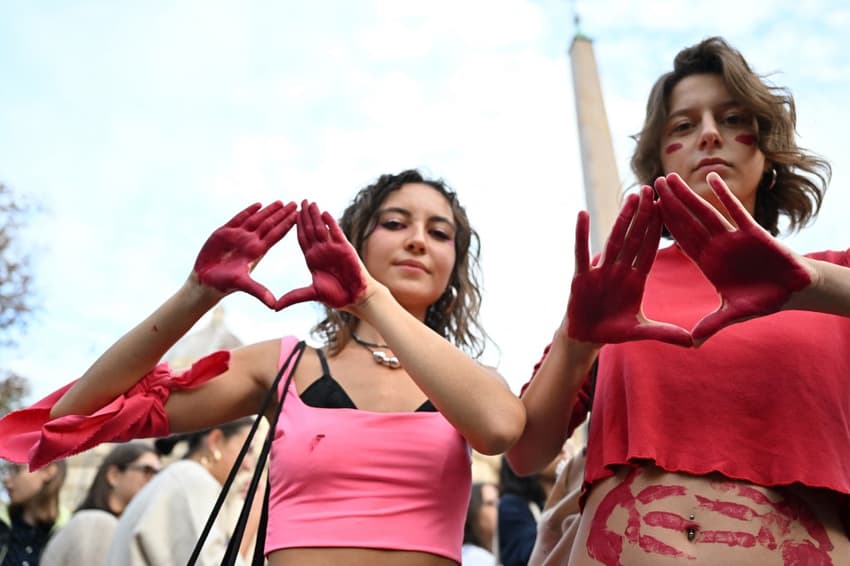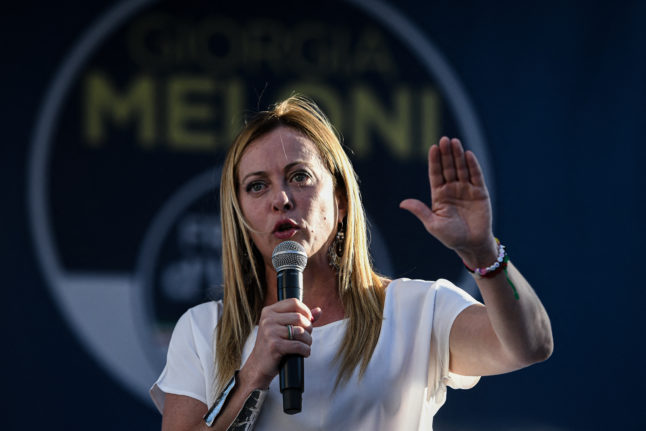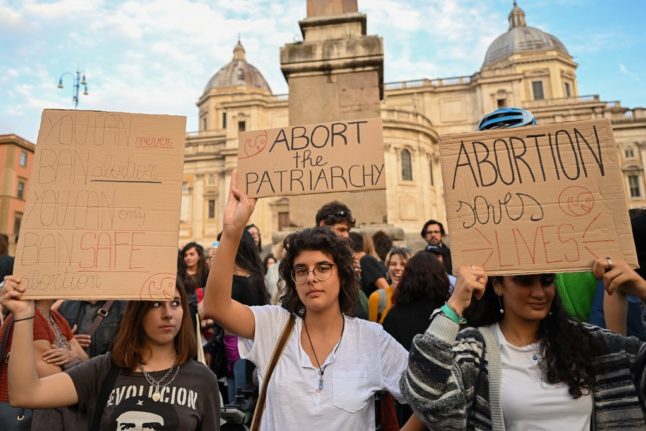Is Italy's first woman prime minister a feminist?

Giorgia Meloni is Italy’s first-ever woman premier, but will she do anything to improve the lives of other women in Italy?
In her rapid rise through Italian politics, Giorgia Meloni has repeatedly shattered the glass ceiling and has now become the first woman premier in the still staunchly patriarchal country.
But many women do not consider the 45-year-old an ally, pointing to her advocacy of "traditional family values" and her opposition to abortion, and what they see as her failure to challenge the social status quo.
Her political views, including her opposition to abortion and LGBTQ rights, are anything but feminist, say analysts.
"All things considered it's a positive thing that for the first time it's a woman" leading the government, said Giorgia Serughetti, a professor of political philosophy at the University of Milano-Bicocca who focuses on gender and politics.
PROFILE: Who is Giorgia Meloni, Italy’s new prime minister?
"But from there to say this is a step forward for women is another thing," she told AFP.
Meloni's post-fascist Brothers of Italy party won the largest share of votes among women in the September 25th elections, in which she played heavily on her own personal brand.

Giorgia Meloni addresses supporters in Milan on September 11, 2022. Photo by Piero CRUCIATTI / AFP.
"I am Giorgia, I am a woman, I am a mother, I am Italian, I am Christian," Meloni said at a 2019 rally. The word 'wife' did not feature as she is not married to her partner, the father of her young daughter.
Serughetti argues this mantra was not a call for women's rights but a "declaration of hostility towards enemies", whether LGBTQ activists, feminists, defenders of mass immigration or others on the political left against whom she often rails.
Meloni has "never played the women's card" in a Catholic-majority country where there is "widespread hostility to feminism", the expert said.
Despite rising to the government's top job, Meloni is not seen as a challenge to "the patriarchy", said Flaminia Sacca, a political sociologist at Rome's Sapienza University.
Meloni is a working mother in a country where only about half of working-age women are employed.
READ ALSO: What will right-wing election victory mean for abortion rights in Italy?
But "she doesn't in any way challenge traditional values, traditional culture and the Catholic culture", said Sacca.
"She's more acceptable, she's not a threat."
No quotas
Meloni has broken several barriers in her political career.
In 2008, she became the country's youngest minister, aged just 31, when she was given the youth portfolio by then-premier Silvio Berlusconi – now one of her coalition allies.
A decade ago, she co-founded Brothers of Italy, becoming the first woman to lead what would ultimately become a major Italian political party. As premier, she now joins a very small group of women who have reached a position of political power.
READ ALSO: EXPLAINED: Is Brothers of Italy a ‘far right’ party?
Italy named its first female head of the lower house of parliament in 1979, but it took another four decades for a woman to hold the second most powerful constitutional role – president of the Senate.
In her 2021 autobiography, Meloni argued that more women in decision-making roles would "lift the moral level and productive effectiveness of our leadership". However, she also said she won't rely on gender quotas, mandatory today on corporate boards, saying she "detests" them.
"I am a woman, but I confess that in all my history in politics I have never felt really discriminated against," she wrote in her book.
Her new government includes six women among 24 cabinet posts, only three of which are ministers with portfolio.
Overall, her coalition, which also includes Matteo Salvini's far-right League, has fewer women lawmakers than any other bloc in parliament.
READ ALSO: Who’s who in Italy’s new hard-right government?
Some 30 percent of their MPs and senators are women, compared to 46 percent of the centrist bloc and 45 percent of the populist Five Star Movement, according to Sacca.
However, they are almost level with the 31 percent of the centre-left Democratic Party, which actively promotes gender parity and women's rights.
Focus on mothers
"Giorgia Meloni is to feminism like a fish on a bicycle: harried, precarious and out of place," wrote prominent Italian-born philosopher and feminist theorist Rosi Braidotti in La Repubblica newspaper in August.
Meloni's discourse on women is nearly exclusively about mothers, with policies supporting birth rates and families, like providing free nursery school, protecting young mothers in the workplace or lowering taxes on baby products.
The focus on maternity is a carryover from fascism that still resonates with right-wing voters, academics Sacca and Serughetti agreed.
 A number of demonstrations have been held across Italy to protest against Meloni’s opposition to abortion. Photo by Alberto PIZZOLI / AFP
A number of demonstrations have been held across Italy to protest against Meloni’s opposition to abortion. Photo by Alberto PIZZOLI / AFP
"She's not speaking of empowerment and careers, she speaks of mothers and their right to keep their job," said Sacca.
Several demonstrations, usually involving young people, have been held across Italy to protest against Meloni's opposition to abortion.
Meloni, who is also against same-sex adoptions and surrogacy, says she has no plans to change Italy's 1978 abortion law, which allows terminations in theory but also permits doctors to refuse to carry them out.
This has created large gaps in coverage across Italy, with some facilities staffed mostly or entirely by personnel who refuse to deliver abortion services. In practice women report facing long delays or being denied assistance altogether.
READ ALSO: Why an Italian woman was forced to go to 23 hospitals to have an abortion
In the past, both Brothers of Italy and the League have resisted attempts to help solve the problem, such as by recruiting specifically non-objecting doctors.
Meloni says that rather than revising the law, she would offer "more choices" to women who feel they have no other option than to abort.
Emma Bonino, a veteran rights activist who leads the +Europe party, fears Meloni will instead "push for the law to be ignored", exacerbating existing difficulties in finding gynaecologists willing to perform terminations.
Under the new PM, the Ministry for Equal Opportunities and Families becomes the Ministry for Families, Birth and Equal Opportunities.
Newly-appointed Families Minister Eugenia Roccella was a leader of Italy's Women's Liberation Movement in the 70's.
But when she returned to politics in the early 2000's after a two decade hiatus she had revised many of her previously-held positions, and has since said that abortion is "not a right" - though insists the new government will not attempt to overturn Italy’s abortion law – and is strongly opposed to adoption by same-sex couples as well as surrogacy and IVF.
Comments
See Also
In her rapid rise through Italian politics, Giorgia Meloni has repeatedly shattered the glass ceiling and has now become the first woman premier in the still staunchly patriarchal country.
But many women do not consider the 45-year-old an ally, pointing to her advocacy of "traditional family values" and her opposition to abortion, and what they see as her failure to challenge the social status quo.
Her political views, including her opposition to abortion and LGBTQ rights, are anything but feminist, say analysts.
"All things considered it's a positive thing that for the first time it's a woman" leading the government, said Giorgia Serughetti, a professor of political philosophy at the University of Milano-Bicocca who focuses on gender and politics.
PROFILE: Who is Giorgia Meloni, Italy’s new prime minister?
"But from there to say this is a step forward for women is another thing," she told AFP.
Meloni's post-fascist Brothers of Italy party won the largest share of votes among women in the September 25th elections, in which she played heavily on her own personal brand.

"I am Giorgia, I am a woman, I am a mother, I am Italian, I am Christian," Meloni said at a 2019 rally. The word 'wife' did not feature as she is not married to her partner, the father of her young daughter.
Serughetti argues this mantra was not a call for women's rights but a "declaration of hostility towards enemies", whether LGBTQ activists, feminists, defenders of mass immigration or others on the political left against whom she often rails.
Meloni has "never played the women's card" in a Catholic-majority country where there is "widespread hostility to feminism", the expert said.
Despite rising to the government's top job, Meloni is not seen as a challenge to "the patriarchy", said Flaminia Sacca, a political sociologist at Rome's Sapienza University.
Meloni is a working mother in a country where only about half of working-age women are employed.
READ ALSO: What will right-wing election victory mean for abortion rights in Italy?
But "she doesn't in any way challenge traditional values, traditional culture and the Catholic culture", said Sacca.
"She's more acceptable, she's not a threat."
No quotas
Meloni has broken several barriers in her political career.
In 2008, she became the country's youngest minister, aged just 31, when she was given the youth portfolio by then-premier Silvio Berlusconi – now one of her coalition allies.
A decade ago, she co-founded Brothers of Italy, becoming the first woman to lead what would ultimately become a major Italian political party. As premier, she now joins a very small group of women who have reached a position of political power.
READ ALSO: EXPLAINED: Is Brothers of Italy a ‘far right’ party?
Italy named its first female head of the lower house of parliament in 1979, but it took another four decades for a woman to hold the second most powerful constitutional role – president of the Senate.
In her 2021 autobiography, Meloni argued that more women in decision-making roles would "lift the moral level and productive effectiveness of our leadership". However, she also said she won't rely on gender quotas, mandatory today on corporate boards, saying she "detests" them.
"I am a woman, but I confess that in all my history in politics I have never felt really discriminated against," she wrote in her book.
Her new government includes six women among 24 cabinet posts, only three of which are ministers with portfolio.
Overall, her coalition, which also includes Matteo Salvini's far-right League, has fewer women lawmakers than any other bloc in parliament.
READ ALSO: Who’s who in Italy’s new hard-right government?
Some 30 percent of their MPs and senators are women, compared to 46 percent of the centrist bloc and 45 percent of the populist Five Star Movement, according to Sacca.
However, they are almost level with the 31 percent of the centre-left Democratic Party, which actively promotes gender parity and women's rights.
Focus on mothers
"Giorgia Meloni is to feminism like a fish on a bicycle: harried, precarious and out of place," wrote prominent Italian-born philosopher and feminist theorist Rosi Braidotti in La Repubblica newspaper in August.
Meloni's discourse on women is nearly exclusively about mothers, with policies supporting birth rates and families, like providing free nursery school, protecting young mothers in the workplace or lowering taxes on baby products.
The focus on maternity is a carryover from fascism that still resonates with right-wing voters, academics Sacca and Serughetti agreed.

"She's not speaking of empowerment and careers, she speaks of mothers and their right to keep their job," said Sacca.
Several demonstrations, usually involving young people, have been held across Italy to protest against Meloni's opposition to abortion.
Meloni, who is also against same-sex adoptions and surrogacy, says she has no plans to change Italy's 1978 abortion law, which allows terminations in theory but also permits doctors to refuse to carry them out.
This has created large gaps in coverage across Italy, with some facilities staffed mostly or entirely by personnel who refuse to deliver abortion services. In practice women report facing long delays or being denied assistance altogether.
READ ALSO: Why an Italian woman was forced to go to 23 hospitals to have an abortion
In the past, both Brothers of Italy and the League have resisted attempts to help solve the problem, such as by recruiting specifically non-objecting doctors.
Meloni says that rather than revising the law, she would offer "more choices" to women who feel they have no other option than to abort.
Emma Bonino, a veteran rights activist who leads the +Europe party, fears Meloni will instead "push for the law to be ignored", exacerbating existing difficulties in finding gynaecologists willing to perform terminations.
Under the new PM, the Ministry for Equal Opportunities and Families becomes the Ministry for Families, Birth and Equal Opportunities.
Newly-appointed Families Minister Eugenia Roccella was a leader of Italy's Women's Liberation Movement in the 70's.
But when she returned to politics in the early 2000's after a two decade hiatus she had revised many of her previously-held positions, and has since said that abortion is "not a right" - though insists the new government will not attempt to overturn Italy’s abortion law – and is strongly opposed to adoption by same-sex couples as well as surrogacy and IVF.
Join the conversation in our comments section below. Share your own views and experience and if you have a question or suggestion for our journalists then email us at [email protected].
Please keep comments civil, constructive and on topic – and make sure to read our terms of use before getting involved.
Please log in here to leave a comment.